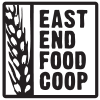
The delegation included people from all aspects of the supply chain.
When is the last time you thought about bananas (beyond adding them to your shopping list and marking them off once you put them in your basket)? Have you ever considered how they get here or how they are grown? This June, Co-op Produce Manager Evan Diamond was part of a delegation to AsoGuabo Cooperative in Ecuador, where he saw first-hand how the bananas we sell are grown and traded. Equal Exchange (a worker-owned cooperative that distributes Certified Fair Trade dry goods and produce to retailers, including the East End Food Co-op) coordinated the trip, which included people from different aspects of the supply chain.
East End Food Co-op (EEFC): Tell us about the trip! Evan: This trip was focused on the Ecuadorian farms that belong to the Cooperative Exporting Group called AsoGuabo, located in El Guabo, about 3 hours inland from Machala, the port city on the Pacific Coast where the bananas are shipped from. The main goal was to provide learning opportunities by connecting the American and Ecuadorian parts of the supply chain through farm tours, round table discussions, and visits to community projects and agricultural research farms.

Co-op Produce Manager Evan Diamond (left) and Jonathan Steffy of Four Seasons (center) after attempting to pack bananas in their boxes.
Why were you selected as part of the delegation? Equal Exchange invited me because East End Food Co-op has a huge commitment to Equal Exchange. I have done a lot of work to maximize our ability to carry and promote their banana program and their newer avocado endeavors.
What is your biggest takeaway from the trip? I was floored by how low–tech and labor-intensive banana farming is. Most modern agriculture is efficient and mechanized to the greatest extent possible. With bananas, equipment can’t enter the fields, so all harvesting, sorting, and packing is done by hand and goes through 6 to 8 people before it is finally boxed up! That really struck a chord with me, considering how cheap and ubiquitous the banana is in the world.
What are some things you’d like people to know based on your experience? Fair Trade is not a given anymore, unfortunately. Large plantations can be fair trade certified now, which opens the door to industry giants like Chiquita and Dole. On these plantations, the scale makes it difficult for a worldwide certifying body to reasonably ensure fair trade practices are being followed. Unlike other companies in the banana trade, Equal Exchange buys from small farms where the farmers own their land. This bolsters an alternative supply chain that maximizes the amount of money staying within the local farm communities.
You can see more photos and videos from Evan’s trip on Instagram.



Leave A Comment